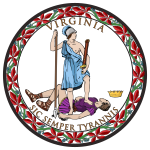| |||||||||||||||||
| Turnout | 40.4% | ||||||||||||||||
|---|---|---|---|---|---|---|---|---|---|---|---|---|---|---|---|---|---|
| |||||||||||||||||
McDonnell: 40–50% 50–60% 60–70% 70–80% 80–90% >90% Deeds: 40–50% 50–60% 60–70% 70–80% 80–90% >90% | |||||||||||||||||
| |||||||||||||||||
| Elections in Virginia |
|---|
 |
The 2009 Virginia gubernatorial election took place in Virginia on November 3, 2009. The incumbent governor, Democrat Tim Kaine, was not eligible to run due to term limits established by the Virginia Constitution, though others in the state's executive branch were not restricted. (Virginia is the only state that prohibits a governor from serving consecutive terms.) Republican Bob McDonnell was elected as governor as part of a Republican sweep. Republican Bill Bolling was reelected as lieutenant governor, and Republican Ken Cuccinelli was elected as attorney general. The winners were inaugurated on January 16, 2010, and served until January 11, 2014.
State Senator Creigh Deeds was selected as the Democratic nominee, having defeated former Democratic National Committee Chairman Terry McAuliffe and former state Delegate Brian Moran in the Democratic primary election.[2][3] This was the first contested Democratic primary in two decades.[4] McDonnell, a former state attorney general, was selected at his party's nominating convention.[5] The two major candidates competed in the 2005 Virginia Attorney General election, and were in a rematch, but in the Governor's race. McDonnell defeated Deeds in the general election by a margin of 59%–41%, much larger than the previous Attorney General election. This would be the last time until 2021 that a Republican would win any statewide election in Virginia. This is also the last time any of the following counties have voted Republican in a statewide race: Albemarle, Fairfax, Prince William, Henrico, Sussex, Brunswick, and the independent city of Suffolk.
- ^ Virginia Department of Elections (2016). "Registration/Turnout Statistics". The Commonwealth of Virginia. Archived from the original on August 16, 2016. Retrieved July 25, 2016.
- ^ Gardner, Amy (January 3, 2009). "Former DNC Chairman McAuliffe Announces Run for Va. Governor". The Washington Post. Retrieved January 3, 2009.
- ^ "2009 June Democratic Primary Unofficial Results". Virginia State Board of Elections. Archived from the original on June 18, 2009. Retrieved June 15, 2009.
- ^ Kumar, Anita (December 2, 2008). "Gubernatorial Candidates Square Off". The Washington Post. Archived from the original on June 12, 2012. Retrieved December 2, 2008.
- ^ Kumar, Anita (November 8, 2008). "Clear Path to Governor's Race". The Washington Post. Retrieved January 6, 2008.




